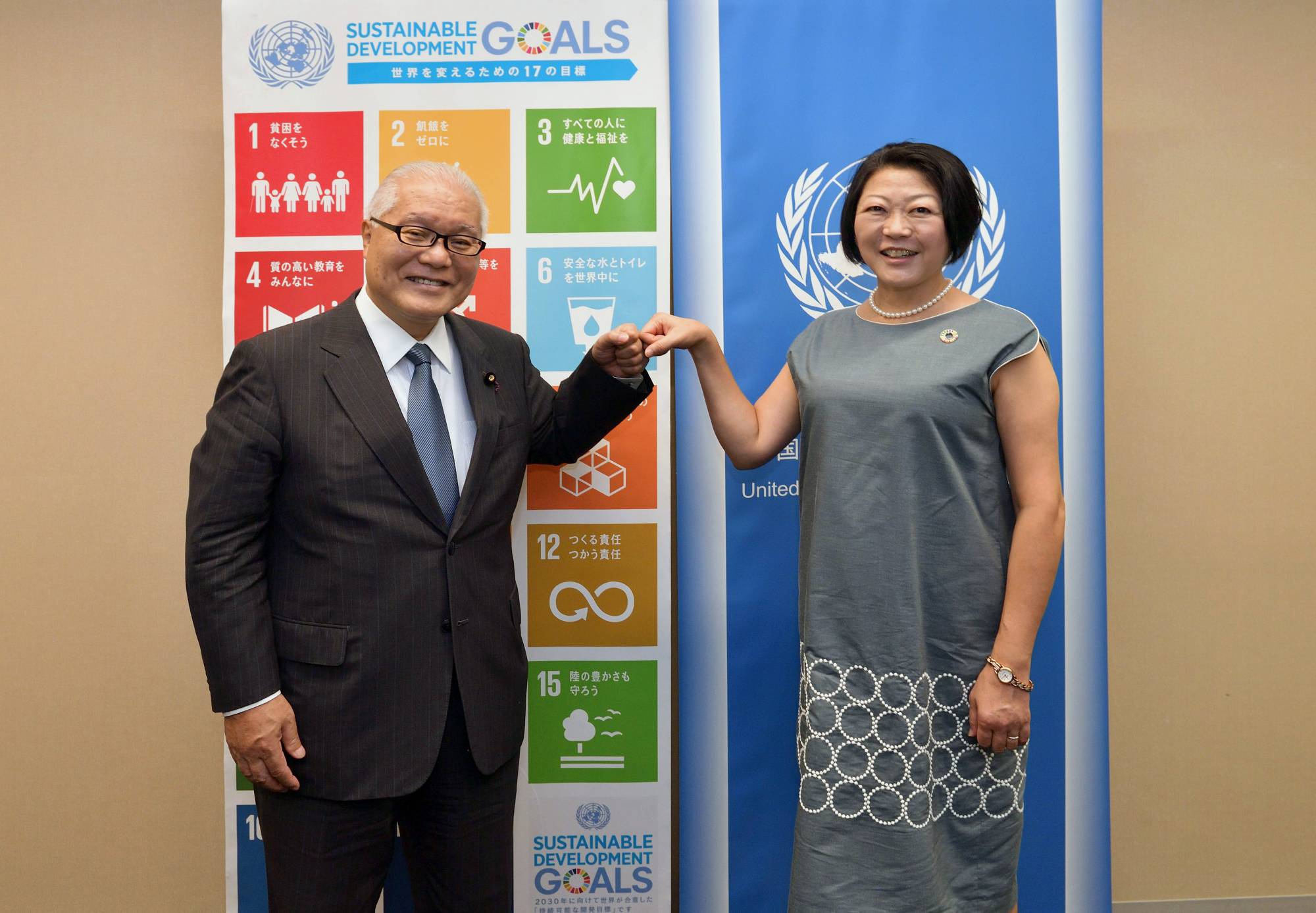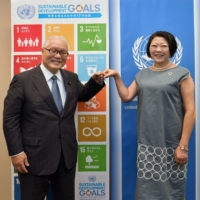The United Nations, which consists of 193 Member States, celebrates its 75th anniversary on Oct. 24. The world has changed since the world body’s establishment in 1945, and the U.N. is now confronting challenges such as climate change, increasing inequalities and most recently, the coronavirus pandemic.
Kaoru Nemoto, Director of the United Nations Information Centre, and Liberal Democratic Party Upper House member Keizo Takemi, who also serves as a Goodwill Ambassador of the World Health Organization for Universal Health Coverage, discuss the issues that the United Nations is facing and why revitalizing multilateralism is necessary.
Nemoto: Oct. 24 is the day the United Nations Charter came into force, making it the United Nations’ birthday. The world had seen two world wars and genocides such as the Holocaust occur. The U.N. was established as an international organization committed to international cooperation after fierce reflection. The three pillars of U.N’s raison d’etre are the maintenance of international peace and security, the promotion of human rights and sustainable development.
We have managed to prevent World War III, but the current international situation, fissures in unilateralism and the inward focus of countries have become conspicuous. I think the United Nations is being tested on how it can mend this situation and move on.
Takemi: In recent years, more and more problems are appearing that cannot be solved by a single country. This in tangent with the spread of globalization, where people, goods, money and information rapidly travel back and forth across national boundaries. The United Nations has played a role in resolving these problems. However, each country has reacted differently to globalization. For example, the disparity between the rich and poor in the information society is widening in developed countries, even though every country is facing common challenges beyond its borders. Despite this, more and more leaders are prioritizing domestic issues in their decision-making.
At the same time, there has been a steady rise in the number of middle powers that do not belong to the three giant blocs — the United States, China, and the EU. As a responsible country among these middle powers, Japan should play a role in resolving a variety of issues and strengthening global governance against the tendency to be home-centric.
When an outbreak of an unknown infectious disease occurs, such as the coronavirus, World Health Organization (WHO) members must report it. However, the WHO has no authority to enforce this obligation. In the case of the coronavirus, it was difficult to share information on identifying the pathogen and determining a treatment policy.
The WHO should have played such a role, but could not, and the virus has unfortunately spread throughout the world.
Nemoto: As Secretary-General Antonio Guterres often says, if countries had listened to WHO at the beginning and made efforts for international cooperation, the situation would not be as damaged as it is. In this 75th anniversary year, Guterres reminds us of solidarity and international cooperation which led to the establishment of the United Nations back in 1945.
Japan was one of the first countries to join the COVAX Facility (a mechanism designed to guarantee rapid, fair and equitable access to coronavirus vaccines worldwide), announcing its participation in it, as well as promoting Universal Health Coverage (UHC) to the world. It is very encouraging to see Japan fulfilling its leadership role in this area.
Takemi: Since February, Dr. Seth Berkley of the GAVI alliance, a vaccine provider, and Dr. Richard Hatchett of the Coalition for Epidemic Preparedness Innovations (CEPI) have been saying it is necessary to collect funds to equally develop and distribute vaccines to developed countries, as well as developing countries.
GAVI and CEPI were designed for developing countries; there is no global governance or scheme. Discussions began in Geneva to create such a scheme, and Switzerland, a nonmember of the EU, Australia, Singapore and Canada joined in. So did Japan.
Nemoto: Japan joined the rule-making process early. I was very proud of that. The United Nations is a Member-State-driven institution, but recently the engagement of nongovernmental players — civil society, private companies, foundations — is becoming more and more critical. They are setting trends on global issues like anti-discrimination, infectious diseases and climate change. That’s what we see with the #MeToo movement, Fridays for Future or Black Lives Matter. The United Nations is a very significant organization in helping to positively frame the power of citizens or nongovernmental actors into policy decisions. For example, the 2030 Agenda for Sustainable Development and Sustainable Development Goals (SDGs) themselves are a very popular topic in Japan. In addition to governments and the United Nations, youth, women, people with disabilities, corporations, financial institutions and academia are engaged and making their voices heard around the world. Since they are involved with the decision-making, they take responsibility for it, too.
Takemi: The SDGs have 17 goals and 169 targets, but these numbers will increase as discussions develop. It is necessary to create a multisectoral approach in the international community, in which various goals are accomplished simultaneously in a derivative manner. The world is now faced with the dilemma of how to simultaneously stop the pandemic and reinvigorate economic activity. I would like to see international organizations like the WHO, which plays a normative role in international community, play a role in developing new policy areas that address both the prevention of the spread of infectious diseases and the revitalization of economic activities, and to demonstrate to the world that such policies are useful.
Nemoto: Guterres has been pushing a multisectoral approach in the United Nations. He is not only the head of the United Nations Secretariat, but also the head of the entire United Nations system, including the WHO. These days, there are so many complex and major challenges that all the United Nations organizations must work together to overcome, using their collective wisdom and functions. I strongly hope Member States continue to support the United Nations, a system that tries to address issues comprehensively.
Takemi: I think the United Nations’ multilateralism must be put back on track. We are in a difficult situation today, but we must not give up. Japan should play a coordinating role with as many countries as possible in rebuilding international agreements on industrial structures and carbon dioxide emission controls under the banner of climate change. In comparison with infectious diseases and medical care, the environment brings up many conflicting factors among countries. Global discussions on these topics take much time and effort, and it is a really difficult area of multilateral diplomacy.
Nemoto: On the climate crisis, one thing that we should not forget is private sector. ESG investment (investment taking environmental, social and corporate governance into account) has become a hot topic, and the day has come when only companies that consider ESG will be able to raise funds. Financing for coal-fired power plants could also become a stranded asset. Major financial institutions are now announcing that they are backing out. Just the other day, Sompo Japan Insurance Inc. announced such a move. That kind of private sector movement may be taking place faster than that of the government.
Takemi: The private sector is moving faster with its initiatives. For example, on smart cities, Toyota Motor Corp. is taking the initiative to lead in expanding the community. We may see the use of automated environmentally friendly electric vehicles. These vehicles may help reduce traffic accidents and create a social structure that is more amenable to the elderly. Japan is late to digitalization, but we can develop within these areas and build a community that can serve as a model for new societies around the world.
Nemoto: The United Nations does not need to hear beautiful congratulatory remarks for its 75th anniversary. Instead, what we want to hear is the voices of the general public. So, we have been holding a year-long “Global Conversation” initiative where we asked people around the world to share their hopes and fears of our future. An interim report showed that people want international cooperation more than we expected. Nearly 90% of respondents said that international cooperation and collaboration are very important. Three out of four said that the United Nations is indispensable and a very significant part of that cooperation. Together with the Member States, the United Nations will be creating an action plan that reflects the opinions of the people, en route to its 100th anniversary.
Takemi: The pandemic is everywhere and the threat has moved beyond national borders. It is impossible for a single country to solve the pandemic problem. That is where the United Nations agencies such as the WHO, the GAVI alliance and CEPI work together. The public has learned through this pandemic that it is still not functioning well. The question is how we should reform these U.N. organizations so that they take on a problem-solving role. I hope the United Nations is able to show the people of the world how to create a new global society that is sustainable and one in which everybody can live in peace.



















With your current subscription plan you can comment on stories. However, before writing your first comment, please create a display name in the Profile section of your subscriber account page.